Thailand
Exotic Allure and Cultural Marvels
Thailand, the Land of Smiles, offers retirees a unique and enchanting experience. With its vibrant culture, rich history, warm climate, and friendly locals, Thailand has become a sought-after destination for retirees seeking adventure, relaxation, and a high quality of life. From the bustling metropolis of Bangkok to the tranquil islands and beach towns, retirees can explore a diverse range of destinations. Let's delve into some of the most popular cities in Thailand and the activities that make them a great vacation destination.
Bangkok:
As the capital of Thailand, Bangkok is a dynamic and captivating city. Retirees can immerse themselves in the rich cultural heritage by visiting the awe-inspiring temples like Wat Arun and Wat Phra Kaew. The city's numerous palaces, such as the Grand Palace, offer a glimpse into Thailand's royal history. Museums like the National Museum and the Jim Thompson House provide fascinating insights into the country's art, history, and silk industry. Retirees can also indulge in the diverse culinary scene, explore bustling markets, and enjoy the vibrant nightlife.
Chiang Mai:
Chiang Mai, nestled in the mountains of northern Thailand, is a haven for retirees seeking a more relaxed pace of life. The city is renowned for its rich cultural heritage, tranquil temples, and serene atmosphere. Retirees can explore iconic temples such as Wat Phra That Doi Suthep and Wat Chedi Luang, or engage in meditation and wellness retreats. Chiang Mai's Old City offers a delightful blend of traditional and modern experiences, with its vibrant night markets, art galleries, and traditional Thai massage centers.
Chiang Rai:
Located in the northernmost part of Thailand, Chiang Rai is a city brimming with historical and cultural treasures. Retirees can visit the famous White Temple (Wat Rong Khun), known for its intricate design and breathtaking beauty. The Blue Temple (Wat Rong Suea Ten) is another must-visit attraction. Chiang Rai's fascinating museums, such as the Oub Kham Museum and the Hill Tribe Museum, offer insights into the region's rich ethnic diversity. AdditionallyHan explore the city's vibrant art scene and indulge in local handicrafts.
Hua Hin
 Hua Hin, a charming beach destination located just a few hours' drive from Bangkok, is a favorite among retirees. Known for its relaxed atmosphere and pristine beaches, Hua Hin offers a range of activities catering to retirees' interests. Golf enthusiasts can enjoy world-class golf courses, while those seeking relaxation can unwind with spa treatments or leisurely walks along the sandy shores. The town's night market is a popular spot to sample delicious seafood and shop for local handicrafts. Hua Hin, a charming beach destination located just a few hours' drive from Bangkok, is a favorite among retirees. Known for its relaxed atmosphere and pristine beaches, Hua Hin offers a range of activities catering to retirees' interests. Golf enthusiasts can enjoy world-class golf courses, while those seeking relaxation can unwind with spa treatments or leisurely walks along the sandy shores. The town's night market is a popular spot to sample delicious seafood and shop for local handicrafts.
Kanchanaburi
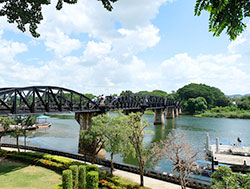 Kanchanaburi, situated in western Thailand, is a town steeped in World War II history. Retirees can visit the infamous Bridge over the River Kwai and the Hellfire Pass Memorial Museum, which provide poignant reminders of the past. The town's picturesque riverside location allows retirees to enjoy scenic boat rides, visit waterfalls, and explore historical sites like the Allied War Cemetery. Nature lovers can also embark on jungle treks and enjoy the serene beauty of Erawan National Park. Kanchanaburi, situated in western Thailand, is a town steeped in World War II history. Retirees can visit the infamous Bridge over the River Kwai and the Hellfire Pass Memorial Museum, which provide poignant reminders of the past. The town's picturesque riverside location allows retirees to enjoy scenic boat rides, visit waterfalls, and explore historical sites like the Allied War Cemetery. Nature lovers can also embark on jungle treks and enjoy the serene beauty of Erawan National Park.
Koh Chang
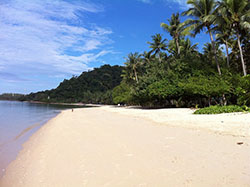 For those seeking a tropical island getaway, Koh Chang is a pristine choice. Located off the coast of eastern Thailand, this large island boasts lush rainforests, cascading waterfalls, and idyllic beaches. Retirees can relax on sandy shores, snorkel or dive in crystal-clear waters, or explore the island's hiking trails. The laid-back vibe and unspoiled beauty of Koh Chang offer the perfect backdrop for a tranquil retirement experience. For those seeking a tropical island getaway, Koh Chang is a pristine choice. Located off the coast of eastern Thailand, this large island boasts lush rainforests, cascading waterfalls, and idyllic beaches. Retirees can relax on sandy shores, snorkel or dive in crystal-clear waters, or explore the island's hiking trails. The laid-back vibe and unspoiled beauty of Koh Chang offer the perfect backdrop for a tranquil retirement experience.
Koh Lanta
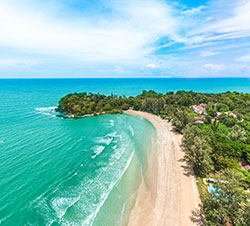 If you are looking for a quieter island escape will find solace in Koh Lanta. Less developed than popular destinations like Phuket and Koh Samui, Koh Lanta exudes a serene ambiance. With its long stretches of sandy beaches, pristine waters, and picturesque sunsets, this island paradise offers the perfect setting for relaxation. Retirees can enjoy leisurely walks along the shore, explore nearby islands on boat tours, or simply unwind in beachfront resorts. If you are looking for a quieter island escape will find solace in Koh Lanta. Less developed than popular destinations like Phuket and Koh Samui, Koh Lanta exudes a serene ambiance. With its long stretches of sandy beaches, pristine waters, and picturesque sunsets, this island paradise offers the perfect setting for relaxation. Retirees can enjoy leisurely walks along the shore, explore nearby islands on boat tours, or simply unwind in beachfront resorts.
Koh Samui
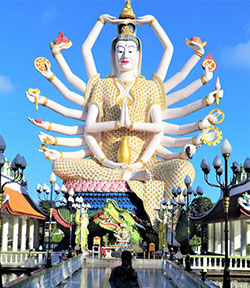 Koh Samui, one of Thailand's most beloved islands, presents retirees with a perfect blend of natural beauty and laid-back charm. Known for its palm-fringed beaches, turquoise waters, and lush greenery, Koh Samui offers a plethora of activities. Retirees can relax on the iconic Chaweng Beach, visit the impressive Big Buddha Temple, or explore the enchanting Na Muang Waterfalls. The island's affordable cost of living and friendly expat community make it an ideal retirement destination. Koh Samui, one of Thailand's most beloved islands, presents retirees with a perfect blend of natural beauty and laid-back charm. Known for its palm-fringed beaches, turquoise waters, and lush greenery, Koh Samui offers a plethora of activities. Retirees can relax on the iconic Chaweng Beach, visit the impressive Big Buddha Temple, or explore the enchanting Na Muang Waterfalls. The island's affordable cost of living and friendly expat community make it an ideal retirement destination.
Krabi
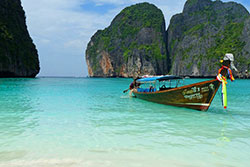 Nestled on the Andaman Sea, Krabi is a beach lover's paradise. The region is renowned for its dramatic limestone cliffs, hidden lagoons, and stunning islands like Phi Phi and Railay. Retirees can embark on island-hopping excursions, go rock climbing, or take leisurely boat tours to explore the picturesque landscapes. With its tranquil beaches and breathtaking natural wonders, Krabi offers retirees a blissful retirement experience. Nestled on the Andaman Sea, Krabi is a beach lover's paradise. The region is renowned for its dramatic limestone cliffs, hidden lagoons, and stunning islands like Phi Phi and Railay. Retirees can embark on island-hopping excursions, go rock climbing, or take leisurely boat tours to explore the picturesque landscapes. With its tranquil beaches and breathtaking natural wonders, Krabi offers retirees a blissful retirement experience.
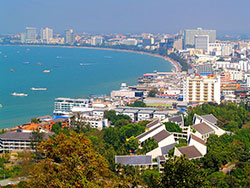
Pattaya
Pattaya, a vibrant beach city located on the Gulf of Thailand, offers retirees a mix of relaxation and entertainment. While Pattaya is known for its bustling nightlife, it also boasts beautiful beaches and a range of recreational activities. Retirees can explore the Sanctuary of Truth, a magnificent wooden temple, or unwind on the tranquil Jomtien Beach. Pattaya's diverse dining options, shopping malls, and cultural shows provide retirees with a lively and engaging retirement experience.
Phuket
Phuket, Thailand's largest island, is a popular choice for retirees seeking a perfect blend of natural beauty and modern conveniences. With its stunning beaches, lush hills, and vibrant towns, Phuket caters to a wide range of interests. Retirees can enjoy swimming, snorkeling, or diving in the azure waters, explore the Old Town's rich heritage, or embark on day trips to nearby islands. Phuket's thriving expat community, world-class healthcare facilities, and international cuisine make it an ideal retirement haven.
Thailand's unique blend of cultural heritage, natural beauty, warm hospitality, and affordable living make it an exceptional retirement destination. Whether retirees seek adventure, relaxation, or a mix of both, Thailand's diverse cities and pristine islands offer something for everyone. From exploring ancient temples to relaxing on sandy beaches, retirees can embark on a new chapter of life filled with discovery, serenity, and unforgettable experiences in the Land of Smiles.
Best Time to Visit:
- Peak Season (November to February): This is generally considered the best time to visit Thailand, especially for retirees. The weather is cooler and more comfortable, with lower humidity levels. It's an ideal time for outdoor activities, exploring cities, and enjoying the beautiful beaches. However, it's also the busiest and most crowded time of the year, so popular tourist destinations may be crowded, and accommodation prices tend to be higher. It's advisable to book in advance.
- Hot Season (March to May): The hot season in Thailand can be quite intense, with temperatures reaching their peak. While it can be scorching, it's still possible to enjoy your trip by planning outdoor activities for mornings and evenings when temperatures are relatively cooler. Coastal areas and islands are popular during this time, offering opportunities for swimming, snorkeling, and water sports. Retirees who can tolerate the heat may find good deals on accommodations and experience fewer crowds.
- Rainy Season (June to October): The rainy season brings frequent rainfall, but it usually consists of short bursts of heavy rain rather than continuous downpours. The advantage of visiting during this time is that you'll encounter fewer tourists, have more affordable accommodations, and witness lush green landscapes. Rain showers often occur in the late afternoon or evening, so mornings can be suitable for outdoor activities. However, it's important to note that some island destinations may have limited services or closures due to rough seas or potential storms. Be prepared with rain gear and check weather forecasts before planning outdoor excursions.
- Overall, the months of November to February offer a good balance of pleasant weather, manageable crowds, and a wide range of activities. However, each season has its own unique advantages, so it ultimately depends on your preferences and priorities when choosing the best time to visit Thailand.
Travel Planning Tips:
- Visa Requirements: Ensure you have the appropriate visa for your stay in Thailand. Retirees typically opt for the non-immigrant O-A visa, which allows for a one-year stay. Check with the Thai embassy or consulate in your home country for the most up-to-date information and requirements.
- Health Considerations: Consult with your healthcare provider well in advance of your trip to Thailand. Ensure you are up-to-date on routine vaccinations and consider any additional vaccinations recommended for the region. Obtain travel insurance that covers medical emergencies and be aware of the availability of quality healthcare facilities in the areas you plan to visit.
- Climate and Packing: Thailand has a tropical climate, so pack lightweight, breathable clothing suitable for warm and humid conditions. Don't forget essentials like sunscreen, insect repellent, a hat, and comfortable walking shoes. If you plan to visit mountainous areas or during the cooler months, pack a light jacket or sweater.
- Currency and Finances: The currency in Thailand is the Thai Baht (THB). It's advisable to carry a mix of cash and credit/debit cards. ATMs are widely available, but inform your bank about your travel plans to avoid any issues with card usage. Retirees may consider notifying their bank of extended stays to prevent any card restrictions.
- Staying Connected: Consider purchasing a local SIM card or activating an international roaming plan to stay connected while in Thailand. Having internet access on your mobile device can be helpful for navigation, translation, and staying in touch with loved ones.
- Research and Plan Ahead: Thoroughly research the destinations you plan to visit, including attractions, local customs, and transportation options. Create a flexible itinerary that allows for rest days and takes into account your preferred pace of travel.
Transportation:
- Domestic Flights: Thailand has a well-connected domestic flight network, making it convenient to travel between major cities and popular tourist destinations. Consider domestic flights for longer distances or when traveling to islands or remote areas.
- Trains:Thailand's railway system offers a scenic and leisurely way to travel. Trains are comfortable, affordable, and a great option for retirees who enjoy a slower pace of travel. Sleeper trains are available for overnight journeys.
- Buses: Thailand has an extensive network of buses, ranging from local minibusses to long-distance coaches. Buses are an economical option for traveling between cities and towns. Look for reputable bus companies and consider booking in advance for popular routes.
- Taxis and Ride-Sharing: Registered taxis and ride-sharing services like Grab are widely available in major cities. Use official taxi stands or reputable apps for booking rides. Always insist on using the meter or agree on a fixed price before starting the journey.
- Private Drivers and Tours: For retirees who prefer personalized service and comfort, hiring a private driver or booking pre-arranged tours can be an excellent option. This allows for flexibility in scheduling and ensures a hassle-free travel experience.
- Tuk-tuks and Songthaews: Tuk-tuks (three-wheeled motorized rickshaws) and songthaews (shared taxis) are popular modes of transportation in Thailand, particularly for short distances or within cities. Negotiate fares in advance for tuk-tuks and check the destination and price before boarding a songthaew.
- Motorbike Taxis: Motorbike taxis are prevalent in urban areas and offer a convenient way to navigate through traffic. However, they can be less safe, especially for retirees with mobility issues or concerns about road safety. Use motorbike taxis only if comfortable and ensure you wear a helmet.
Safety Tips:
- Stay Vigilant: While Thailand is generally safe for travelers, it's important to stay vigilant, especially in crowded areas and tourist hotspots. Be cautious of your surroundings, keep an eye on your belongings, and avoid displaying valuable items.
- Use Reliable Transportation: Stick to reputable transportation options such as registered taxis, ride-sharing services like Grab, or pre-arranged private transfers. Avoid unlicensed taxis or unmarked vehicles to ensure your safety during travel.
- Secure Accommodations: Choose accommodations in safe and well-reviewed areas. Look for accommodations with secure locks, safes, and 24-hour front desk services. Request rooms on lower floors for easier access and avoid isolated locations, especially if traveling alone.
- Carry Identification: Always carry a copy of your passport, visa, and other important identification documents. Keep the originals secured in a hotel safe. Having identification with you is important for any unexpected situations.
- Stay Hydrated: Thailand's climate can be hot and humid, so it's essential to stay hydrated. Carry a reusable water bottle and drink plenty of water throughout the day to prevent dehydration.
- Be Cautious with Street Food: Thailand is famous for its street food, but it's important to choose vendors carefully. Opt for stalls with high turnover rates and a clean appearance. Ensure food is cooked thoroughly and served hot to reduce the risk of foodborne illnesses.
- Respect Local Laws and Customs: Familiarize yourself with local laws and customs to avoid any legal issues or cultural misunderstandings. Pay attention to dress codes, especially when visiting temples or religious sites, and show respect for Thai customs and traditions.
- Travel Advisories Stay updated on current events, local regulations, and any travel advisories when traveling abroad. Visit the US Government State Department Travel Advisories web site to check on the status of your destination.
- Enroll in the STEP Program: Travelers are also urged to enroll in the U.S. State Department's Smart Traveler Enrollment Program (STEP) to receive security messages and to make it easier to locate them in an emergency. The Department uses these security messages to convey information about terrorist threats, security incidents, planned demonstrations, natural disasters, etc. In an emergency, please contact the nearest U.S. Embassy or consulate or call the following numbers: 1 (888) 407-4747 (toll-free in the United States and Canada) or 1 (202) 501-4444 from other countries.
| |
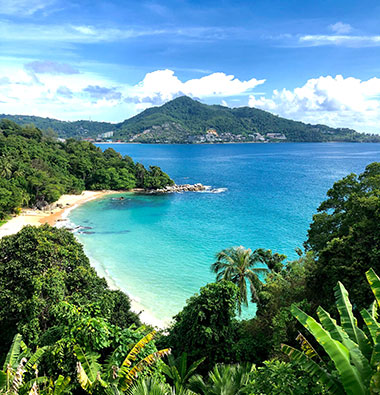 Phuket
Photo by Bradley Prentice/Unsplash
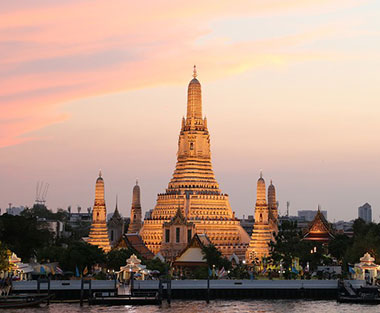 Wat Arun, Bangkok
Photo by Carina Hofmeister
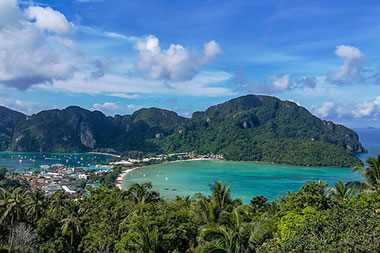 Phi Phi Island, Phuket
Photo by Kmarius
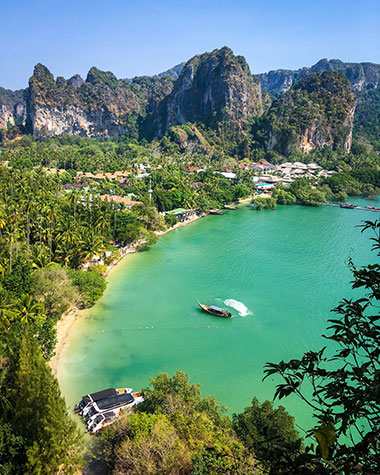 Railay-Beach, Krabi
Photo by Una Baufala
|
 Hua Hin, a charming beach destination located just a few hours' drive from Bangkok, is a favorite among retirees. Known for its relaxed atmosphere and pristine beaches, Hua Hin offers a range of activities catering to retirees' interests. Golf enthusiasts can enjoy world-class golf courses, while those seeking relaxation can unwind with spa treatments or leisurely walks along the sandy shores. The town's night market is a popular spot to sample delicious seafood and shop for local handicrafts.
Hua Hin, a charming beach destination located just a few hours' drive from Bangkok, is a favorite among retirees. Known for its relaxed atmosphere and pristine beaches, Hua Hin offers a range of activities catering to retirees' interests. Golf enthusiasts can enjoy world-class golf courses, while those seeking relaxation can unwind with spa treatments or leisurely walks along the sandy shores. The town's night market is a popular spot to sample delicious seafood and shop for local handicrafts.
 Kanchanaburi, situated in western Thailand, is a town steeped in World War II history. Retirees can visit the infamous Bridge over the River Kwai and the Hellfire Pass Memorial Museum, which provide poignant reminders of the past. The town's picturesque riverside location allows retirees to enjoy scenic boat rides, visit waterfalls, and explore historical sites like the Allied War Cemetery. Nature lovers can also embark on jungle treks and enjoy the serene beauty of Erawan National Park.
Kanchanaburi, situated in western Thailand, is a town steeped in World War II history. Retirees can visit the infamous Bridge over the River Kwai and the Hellfire Pass Memorial Museum, which provide poignant reminders of the past. The town's picturesque riverside location allows retirees to enjoy scenic boat rides, visit waterfalls, and explore historical sites like the Allied War Cemetery. Nature lovers can also embark on jungle treks and enjoy the serene beauty of Erawan National Park.
 For those seeking a tropical island getaway, Koh Chang is a pristine choice. Located off the coast of eastern Thailand, this large island boasts lush rainforests, cascading waterfalls, and idyllic beaches. Retirees can relax on sandy shores, snorkel or dive in crystal-clear waters, or explore the island's hiking trails. The laid-back vibe and unspoiled beauty of Koh Chang offer the perfect backdrop for a tranquil retirement experience.
For those seeking a tropical island getaway, Koh Chang is a pristine choice. Located off the coast of eastern Thailand, this large island boasts lush rainforests, cascading waterfalls, and idyllic beaches. Retirees can relax on sandy shores, snorkel or dive in crystal-clear waters, or explore the island's hiking trails. The laid-back vibe and unspoiled beauty of Koh Chang offer the perfect backdrop for a tranquil retirement experience.
 Phuket
Phuket Wat Arun, Bangkok
Wat Arun, Bangkok Phi Phi Island, Phuket
Phi Phi Island, Phuket Railay-Beach, Krabi
Railay-Beach, Krabi